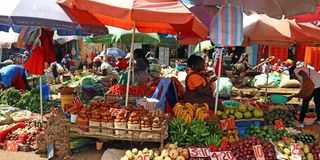End of year letter to ‘Mama Mboga’

Vegetable vendors along Naivasha Road, Nairobi on June 2, 2023.
What you need to know:
- No one cuts this sad image of the economic struggle better than a mama mboga sitting forlornly at a street corner selling some sparse items.
- For twelve straight months in a year, every day, she often sells items of little value but she spends the whole day under the sun.
“Dear Ma… Ma, there is so much I want to tell you. I was once foolish enough to believe knowledge would clarify, but some things are so gauzed behind layers of syntax and semantics, behind days and hours, names forgotten, salvaged and shed, that simply knowing the wound exists does nothing to reveal it…
Because I am your son, what I know of work I know equally of loss. And what I know of both I know of your hands. Their once supple contours I’ve never felt, the palms already callused and blistered long before I was born, then ruined further from three decades in factories and nail salons. Your hands are hideous — and I hate everything that made them that way. I hate how they are the wreck and reckoning of a dream.
How you’d come home, night after night, plop down on the couch, and fall asleep inside a minute. I'd come back with your glass of water and you’d already be snoring, your hands in your lap like two partially scaled fish…When you worked for a year at the clock factory, I called your boss and said, in my most polite diction, that my mother would like her hours reduced.
Why? Because she was exhausted, because she was falling asleep in the bathtub after she came home from work, and that I was afraid she would drown… You groaned with relief as we worked your muscles loose, unraveling you with nothing but our own weight. You lifted your finger and, speaking into the blanket, said, ‘Am I happy?’ …I don’t know if you are happy, Ma”.
This excerpt is from On Earth We're Briefly Gorgeous by Ocean Vuong. It is written as a heartrending letter from a son to his mother. The callused hands are a symbol of the cost of raising a child as a single mother in America. The novel is an epitome of how literary works can capture the fragmented realities of the struggle for survival.
The letter could easily have been written by a Kenyan boy to his mother. As we reflect on the year that was, for most Kenyans, it was admittedly a rough year especially economically. And no one cuts this sad image of the economic struggle better than a mama mboga (a female vegetable seller) sitting forlornly at a street corner selling some sparse items.
For twelve straight months in a year, every day, from sunrise to the fading light of dusk, she often sells items of little value but she spends the whole day under the sun — probably under a beautiful blue-silver sky of a Nairobi afternoon.
If there is a mist, it sparkles, sometimes like a blanket of silver pebbles, other times reflecting the orange glow of a warm sunset — the world seemingly lulled into an eerie, untouched quiet of mournful resonance. But she sees none of this beauty. She misses these fleeting sensations of a real moment.
The only reality she has is the sheer dogged persistence and will to survive that carries her into the future. In the evening, she goes home with a few coins. And probably with callused hands. Is she happy?
In the novel On Earth We're Briefly Gorgeous, the narrator asks, “Do you remember the happiest day of your life? What about the saddest? Do you ever wonder if sadness and happiness can be combined, to make a deep purple feeling, not good, not bad, but remarkable simply because you didn’t have to live on one side or the other?”
The mama mboga may not care much about happiness, or sadness or if there is a combination that makes a “deep purple feeling”. She only cares for the happiness of her son. And she will sacrifice anything.
In a strange way, it’s like the biblical story of Abraham and his son Isaac. Only that in this case, it’s a mother and a son making the trek of solitude towards an altar of another dimension of sacrifice, and that, unlike in the Bible story, only the son would come back, leaving his mother behind in the shadows of servitude to hard labour and callused hands.
The son would hopefully rise and become a great man in the society while the mother works and sacrifices her life away. And by the time the son can support his mother, she is so advanced in years that she can’t enjoy anything or worse still, gone to the land of no return.
For Kenya’s mama mbogas and many other people, 2023 is the year they went through the extremes of hope and the despair of doomed love. The year started with some optimism that the then new government, elected on the platform of helping those at the bottom of the pyramid (“hustlers” including mama mbogas), would perform economic miracles: tame runaway inflation and skyrocketing prices and make lives better for everyone.
We hope the current administration remembers the mama mboga who was the centrepiece of the campaigns for office. The politicians now in power will hopefully remember the mama mboga with her callused hands and the empty stomachs of her children at home — children who wait as expectantly as small birds wait for their mother in the nest — with eyes closed, mouths open.
The writer is a book publisher based in Nairobi. [email protected]





